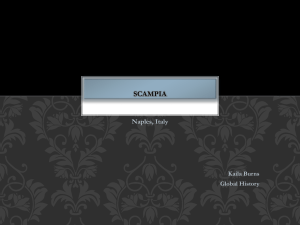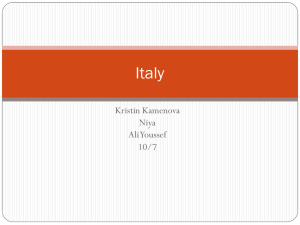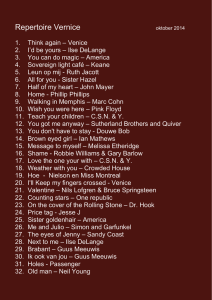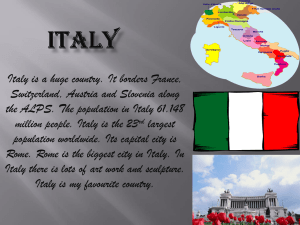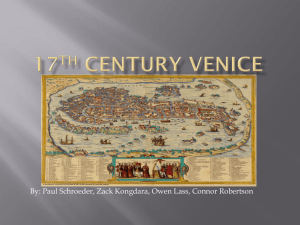Charles Burney/First Music History
advertisement
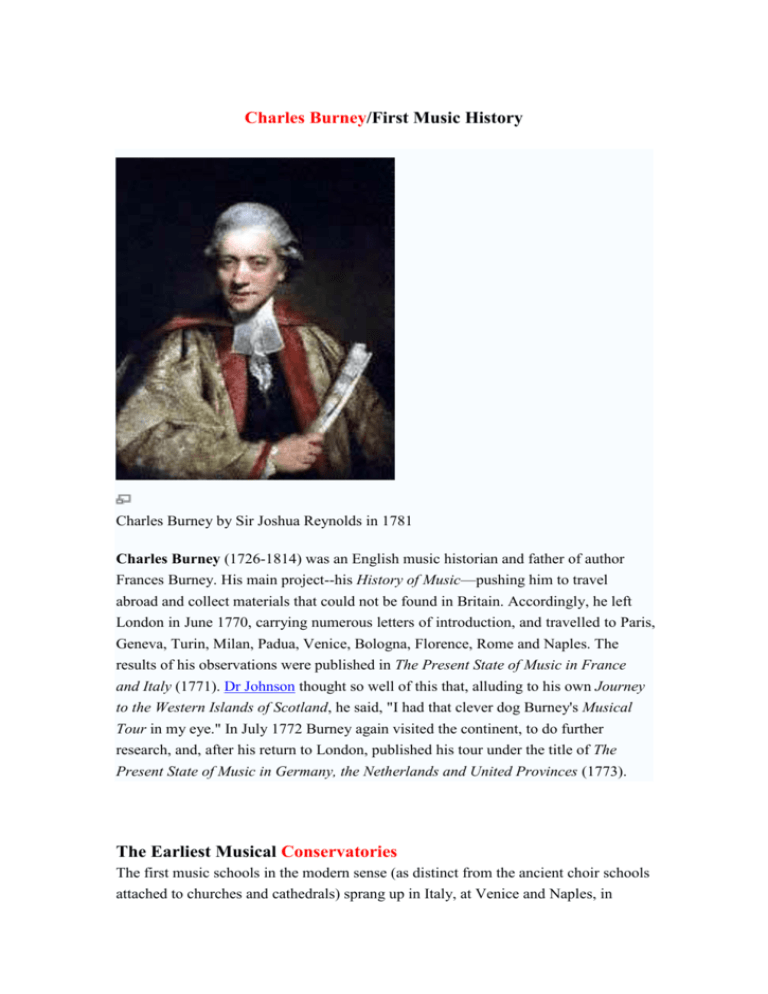
Charles Burney/First Music History Charles Burney by Sir Joshua Reynolds in 1781 Charles Burney (1726-1814) was an English music historian and father of author Frances Burney. His main project--his History of Music—pushing him to travel abroad and collect materials that could not be found in Britain. Accordingly, he left London in June 1770, carrying numerous letters of introduction, and travelled to Paris, Geneva, Turin, Milan, Padua, Venice, Bologna, Florence, Rome and Naples. The results of his observations were published in The Present State of Music in France and Italy (1771). Dr Johnson thought so well of this that, alluding to his own Journey to the Western Islands of Scotland, he said, "I had that clever dog Burney's Musical Tour in my eye." In July 1772 Burney again visited the continent, to do further research, and, after his return to London, published his tour under the title of The Present State of Music in Germany, the Netherlands and United Provinces (1773). The Earliest Musical Conservatories The first music schools in the modern sense (as distinct from the ancient choir schools attached to churches and cathedrals) sprang up in Italy, at Venice and Naples, in connection with charitable institutions that cared for orphans and foundlings. By the eighteenth century, Venice was celebrated for its four "hospitals" for girls, Naples for its four "conservatories" (the two words meant the same thing) for boys. The concerts ngven by the giris at Venice, where musicians as eminent as Vivaldi oversaw the instruction, were particularly admired. Among the many travelers' reports on their prowess is this, by the historian Charles Burney (1726-1814), who visited Italy in 1770. Sat. Aug. 4. [Venice] is famous for its conservatories or music schools, of which it has four, the Ospedale della Pieta, the Mendicanti, the Incurabili, and the Ospedaletto a St. Giovanni e Paolo, at each of which there is a performance every Saturday and Sunday evening, as well as on great festivals. In the evening I went to that of the Pieta. The performers, both vocal and instrumental, are all girls; the organ, violins, flutes, violoncellos, and even French horns, are supplied by these females. It is a kind of Foundling Hospital for natural children, under the protection of several nobles, citizens, and merchants, who, though the revenue is very great, yet, contribute annually to its support. These girls are maintained here till they are married, and all those who have talents for music are taught by the best masters of Italy. Sun. Aug. 5. In the afternoon I went to the hospital de' Mendicanti, for orphan girls, who are taught to sing and play, and on Sundays and festivals they sing divine service in chorus. From hence I went to the Ospedaletto. The performers here too are all orphan girls; one of them, la Ferrarese, sung very well, and had a very extraordinary compass of voice, as she was able to reach the highest E of our harpsichords, upon which she could dwell a considerable time, in a fair, natural voice. At the Hospitals and in Churches, where it is not allowed to applaud in the same manner as at the Opera, they cough, hem, and blow their noses, to express admiration. Frid. Aug. 10. I had this morning a long visit from Signer [Gaetano] Latilla [1711-88, a well-known composer at the time]. He says the Conservatorios have been established at Venice about 200 years, as hospitals. That at first the girls were only taught canto firmo [Gregorian chant], and psalmody; but in process of time, they learned to sing in parts, and, at length joined instruments to the Voices. He says the expense on account of the music is very inconsiderable, there being but 5 or 6 Masters to each of these schools for singing and the several instruments, as the elder girls teach the younger; the Maestro di Cappella [director] only composes and directs; sometimes, indeed, he writes down closes [cadenzas] to suit particular airs, and attends all the rehearsals and public performances. [Naples,] Wed. Oct. 31. This morning I went with young Oliver to his Conservatorio of St. Onofrio, and visited all the rooms where the boys practise, sleep, and eat. On the first flight of stairs was a trumpeter, screaming upon his instrument till he was ready to burst; on the second was a french-horn, bellowing in the same manner. In the common practising room there was a Dutch concert, consisting of seven or eight harpsichords, more than as many violins, and several voices, all performing different things, and in different keys: other boys were writing in the same room; but it being holiday time, many were absent who usually study and practise there together. The jumbling them all together in this manner may be convenient for the house, and may teach the boys to attend to their own parts with firmness, whatever else may be going forward at the same time; it may likewise give them force, by obliging them to play loud in order to hear themselves; but in the midst of such jargon, and continued dissonance, it is wholly impossible to give any kind of polish or finishing to their performance; hence the slovenly coarseness so remarkable in their public exhibitions; and the total want of taste, neatness, and expression in all these young musicians, till they have acquired them elsewhere. The beds, which are in the same room, serve as seats for the harpsichords and other instruments. Out of thirty or forty boys who were practising, I could discover but two that were playing the same piece: some of those who were practising on the violin seemed to have a great deal of hand. The violoncellos practise in another room: and the flutes, oboes, and other wind instruments, in a third, except the trumpets and horns, which are obliged to fag [labor] either on the stairs, or on the top of the house. There are in this college sixteen young castrati [see next selection], and these live up stairs, by themselves, in warmer apartments than the other boys, for fear of colds, which might not only render their delicate voices unfit for exercise at present, but hazard the entire loss of them for ever. The only vacation in these schools, in the whole year, is in autumn, and that for a few days only: during the winter, the boys rise two hours before it is light, from which time they continue their exercise, an hour and a half at dinner excepted, till eight o'clock at night; and this constant perseverance, for a number of years, with genius and good teaching, must produce great musicians. Percy A. Scholes (ed.), Dr. Burner's Musical Tours in Europe (London: Oxford Univer-sity Press, 1959), I, 112, 113-15, 121, 269-70. Castrato Singers The leading male roles of Italian heroic opera in the seventeenth and eighteenth centuries were sung by men with powerful soprano and contralto voices. They had been operated on before puberty, so that they retained their childish voices as grown men. This inhuman custom did not shock most opera lovers, al-though there were moralists, especially outside of Italy, who found it objectionable. (On the other hand, it should be remembered that even worse things, such as public torture and executions, were still widely accepted at the time.) Because the operation was forbidden by law throughout Italy, foreign travelers were understandably curious to know where all the castrates (or rnusici, as the Italians called them) actually came from. Charles Burney (whom we met in the previous reading and will often meet again) was just such an inquisitive traveler. I enquired throughout Italy at what place boys were chiefly qualified for singing by castration, but could get no certain intelligence. I was told at Milan that it was at Venice; at Venice, that it was at Bologna; but at Bologna the fact was denied, and I was referred to Florence; from Florence to Rome, and from Rome I was sent to Naples. The operation most certainly is against law in all these places, as well as against nature; and all the Italians are so much ashamed of it, that in every province they transfer it to some other. However, with respect to the Conservatories at Naples, Mr. Jemineau, the British consul, who has so long resided there, and who has made very particular enquiries, assured me, and his account was confirmed by Dr. Cirillo, an eminent and learned Neapolitan physician, that this practice is absolutely forbidden in the Conservatorios, and that the young Castrati came from Lecce in Puglia; but, before the operation is performed, they are brought to a Conservatorio to be tried as to the probability of voice, and then are taken home by their parents for this barbarous purpose. It is said, however, to be death by the laws to all those who perform the operation, and excommunication to every one concerned in it, unless it be done, as is often pretended, upon account of some disorders which may be supposed to require it, and with the consent of the boy. And there are instances of its being done even at the request of the boy himself, as was the case of the Grassetto at Rome. But as to their previous trials of the voice, it is my opinion that the cruel operation is but too frequently performed without trial, or at least without sufficient proofs of an improvable voice; otherwise such numbers could never be found in every great town throughout Italy, without any voice at all, or at least without one sufficient to compensate such a loss. Indeed all the musici in the churches at present are made up of the refuse of the opera houses, and it is very rare to meet with a tolerable voice upon the establishment in any church throughout Italy. The virtuosi who sing there occasionally, upon great festivals only, are usually strangers, and paid by the time. Percy A. Scholes (ed.), Dr Burney's Musical Tours in Europe (London: Oxford University Press, 1959), I, 247-48. Obviously, only very few castrates ever became operatic stars. And when they did, they generally behaved as pompously as any self-important star would, thus furnishing humorists with plenty of subject matter for jokes and satirical writ-ings. Some castrates, however, were men of considerable culture and musical ge-nius. The greatest of them by all accounts was Carlo Broschi, called "Farinelli" (1705-82), counselor to two Spanish kings and intimate friend of Italy's greatest poet at the time, Pietro Metastasio (1698-1782). Burney met him in his retire-ment, and gave his biography as follows: Farinelli, by Wagner after Amigoni 1735 Farinelli was born at Naples in 1705; he had his Rrst musical educa-tion from his father. Signer Broschi, and afterwards was under [Nicola] Porpora [a celebrated composer, and teacher of Haydn, among others], who travelled with him; he was seventeen when he left that city to go to Rome, where, during the run of an opera, there was a struggle every night between him and a famous player on the trumpet, in a song accompanied by that instrument: this, at first, seemed amicable and merely sportive, till the audience began to interest themselves in the contest, and to take different sides: after severally swelling out a note, in which each manifested the power of his lungs, and tried to rival the other in brilliancy and force, they had both a swell and a shake together, by thirds, which was continued so long, while the audience eagerly waited the event, that both seemed to be exhausted; and, in fact, the trumpeter, wholly spent, gave it up, thinking, however, his antagonist as much tired as himself, and that it would be a drawn battle; when Farinelli with a smile on his countenance, shewing he had only been sporting with him all this time, broke out all at once in the same breath, with fresh vigour, and not only swelled and shook the note, but ran the most rapid and difficult divisions [i.e., passages], and was at last silenced only by the acclamations of the audience. From this period may be dated that superiority which he ever maintained over all his contemporaries. From Rome he went to Bologna. From thence he went to Venice, and from Venice to Vienna; in all which cities his powers were regarded as miraculous; but he told me, that at Vienna, where he was three different times, and where he received great honours from the Emperor Charles VI, an admonition from that prince was of more service to him than all the precepts of his masters, or examples of his competitors for fame: his Imperial Majesty condescended to tell him one day, with great mildness and affability, that in his singing, he neither moved nor stood still like any other mortal; all was supernatural. 'Those gigantic strides, said he; those never-ending notes and passages, ces notes qui ne finissent jamuis, only surprise, and it is now time for you to please; you are too lavish of the gifts with which nature has endowed you; if you wish to reach the heart, you must take a more plain and simple road/ These few words brought about an entire change in his manner of singing; from this time he mixed the pathetic with the spirited, the simple with the sublime, and, by these means, delighted as well as astonished every hearer. In the year 1734, he came to England, where every one knows who heard, or has heard of him, what an effect his surprising talents had upon the audience: it was ecstasy! rapture! enchantment! On his arrival here, at the first private rehearsal at Cuzzonfs apartments [Cuzzoni was the great prima donna playing opposite him that season]. Lord Cooper, then the principal manager of the opera under Porpora, observing that the band did not follow him, but were all gaping with wonder, as if thunder-struck, desired them to be attentive; when they all confessed, that they were unable to keep pace with him: having not only been disabled by astonishment, but overpowered by his talents. In the famous air Son qual Nave, which was composed by his brother, the first note he sung was taken with such delicacy, swelled by minute degrees to such an amazing volume, and afterwards diminished in the same manner to a mere point, that it was applauded for full five minutes. After this he set off with such brilliancy and rapidity of execution, that it was difficult for the violins of those days to keep pace with him. In short, he was to all other singers as superior as the famous horse Childers was to all other running-horses; but it was not only in speed that he excelled, for he had now every excellence of every great singer united. In his voice, strength, sweetness, and compass; and in his style, the tender, the graceful, and the rapid. Indeed he possessed such powers as never met before, or since, in any one human being; powers that were irresistible, and which must have subdued every hearer; the learned and the ignorant, the friend and the foe. With these talents he went into Spain in the year 1737, with a full design to return to England; but the first day he performed before the king and queen of Spain, it was determined that he should be taken into the services of the court, to which he was ever after wholly appropriated, not being once suffered to sing again in public. A pension was then settled on him of upwards of £2000 sterling a year. He told me, that for the first ten years of his residence at the court of Spain, during the life of Philip the Vth, he sung every night to that monarch the same four airs. When the present king of Spain [Charles III] ascended the throne, he was obliged to quit that kingdom, but a good pension was still continued, and he was allowed to bring away all his effects. After visiting Naples, the place of his nativity, he settled at Bologna in 1761, in the environs of which city he built himself a splendid mansion, which in Italy is called a palazzo. Here he resided the rest of his life, in the true enjoyment of affluent leisure; respected by the inhabitants of Bologna; visited by illustrious travellers; and still enjoying the smiles of fortune, though denied the blandishments of a court. This extraordinary musician, and worthy man, died in 1782. Scholes, Dr. Burney, I, 153-55; and Charles Burney, A General History of Music, ed. Frank Mercer (New York: Dover Publications, Inc., 1957), II, 790, 817.
